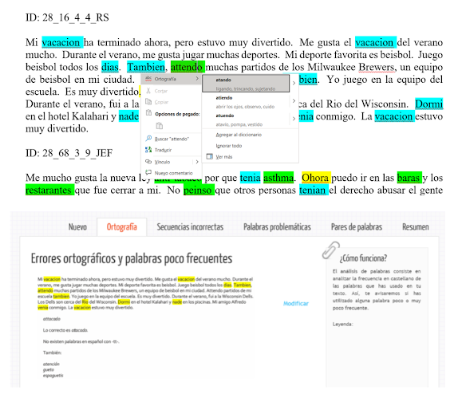An easy-to-build computer-based spellchecker designed to help foreign language learners in writing provides error-specific feedback with explanations and examples
16 Jan 2024

In second language (L2) acquisition, writing is no longer perceived as a mere consequence of learning, but is now treated as a tool to facilitate the learning process itself. Additionally, errors are now considered to be learning opportunities. In the era of digital learning where self-study becomes salient, feedback from computerized spellcheckers is one way of increasing learner autonomy without requiring additional time and effort from the teacher. However, students often complain about the self-correction process which they find tedious and difficult in the absence of aid. Furthermore, existing spellcheckers designed for native speakers actually keep L2 learners from learning from their mistakes. An appropriately programmed software capable of detecting errors while providing pedagogic feedback will likely help L2 learners not only to notice the gap between their own output and the correct form, but also to develop explicit knowledge for future writing.
This paper explains how we developed a pedagogic spellchecker (PSC) better attuned to their needs. First, the Spanish foreign language (FL) learners’ interlanguage was accounted for through real data analysis within the framework of error analysis and corpus linguistics. When all misspellings in the CORANE corpus (Cestero Mancera & Penadés Martínez, 2009) were identified and scrutinized, a selection process was implemented to identify errors deemed worthy of specific feedback. Pedagogical feedback was carefully designed for each error selected including potential violations of the same orthographic pattern despite non-occurrence in the corpus. Another corpus, CEDEL2 (Lozano, 2022), was subsequently used to compare the PSC’s efficacy in error recognition and feedback provision vis-á-vis Microsoft Word’s (MW) spellchecker.
As a result, this specifically-crafted correcting tool is not only capable of identifying more Spanish L2 learners’ errors than MW but it also provides brief, error-specific feedback, explaining relevant spelling rules and giving examples which follow the same pattern. Consequently, Spanish FL learners would potentially use this tool to confidently self-correct their writing and learn from their errors, saving time and effort on the teacher’s part.
Relevance
In this study, we proposed and developed an easy-to-build computer-based spellchecker specifically designed to help foreign language learners in their writing process by facilitating self-correction. The aim was to overcome the disadvantages to FL learners posed by generic spellcheckers, such as that embedded in MW. Drawbacks include autocorrection, misdiagnoses, and overlooked errors. With the aim of imparting explicit FL spelling knowledge, this correcting tool does not merely suggest possible alternatives to the detected error, but also provides explanations of any relevant spelling patterns. This has great implications to the development of spell-check packages and L2 teaching alike since this study shows that complex spelling rules can be adapted in an easy and accessibly way to respond to the needs of the SFL learners. Consequently, providing Spanish FL teachers and learners with an online tool capable of offering feedback in the form of an explicit explanation as to why the error was committed and how it can be solved, may liberate them from the time-consuming task of pedagogical correction and self-correction respectively. Such feedback allows the former to confidently self-correct a significant proportion of orthographic errors. A student can correct many of his/her errors, which may also serve as learning opportunities, even before the written output is submitted (needless to say, L2 learners, in the absence of a teacher, might only have self-computer assistance at their disposal), which saves a significant amount of time and effort on the teacher’s part. This would allow teachers to potentially allocate their time and efforts to other more pressing aspects of L2 writing acquisition where spellcheckers prove less helpful such as content, argument, organizational structure, or register.
Read the full paper: https://doi.org/10.1017/S0958344023000150
